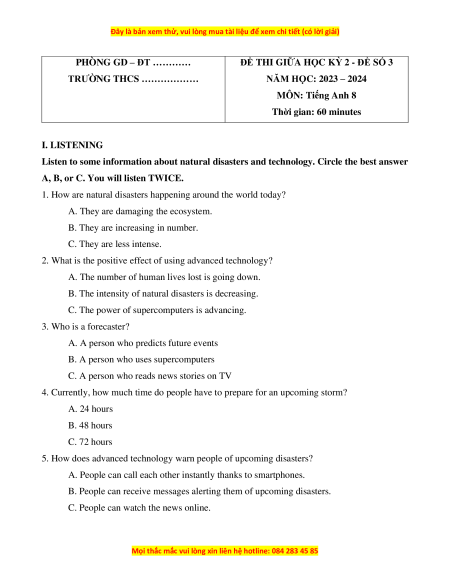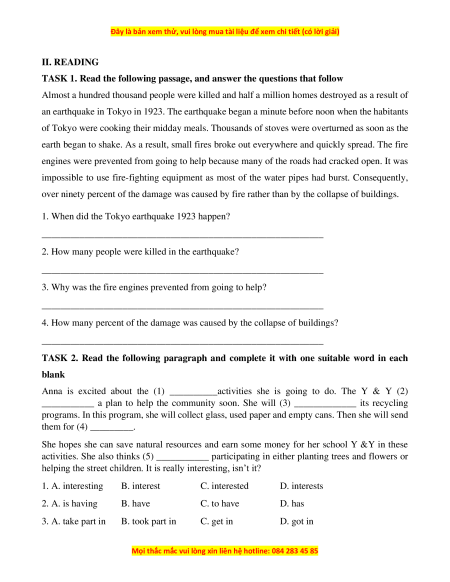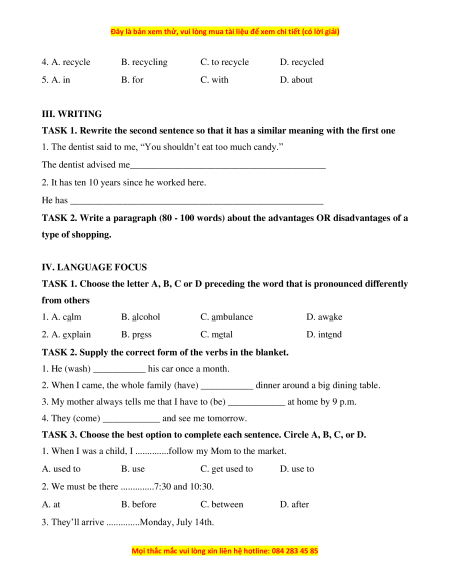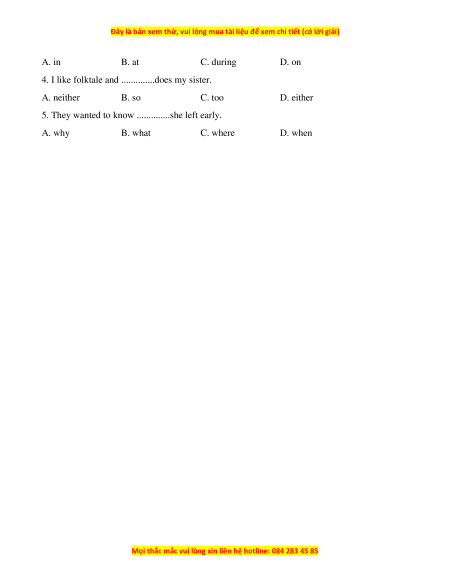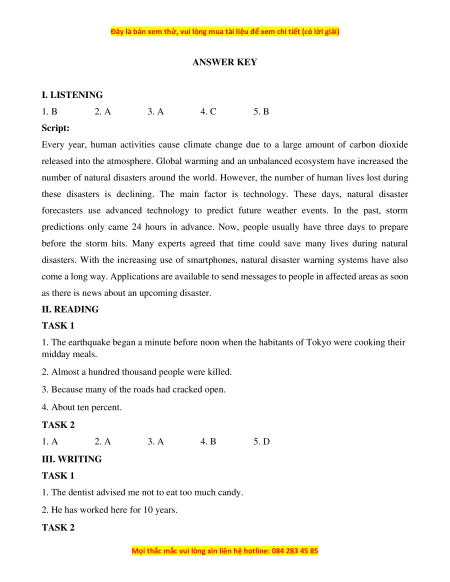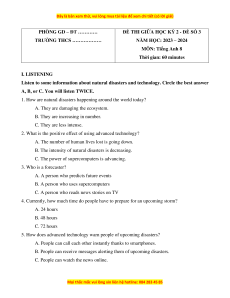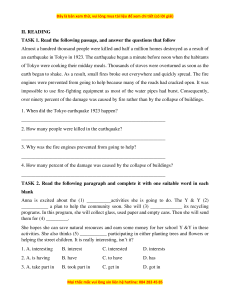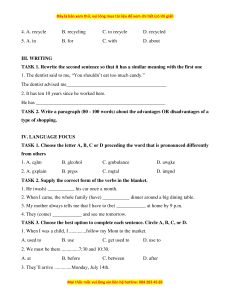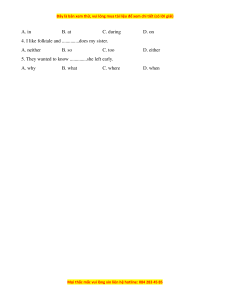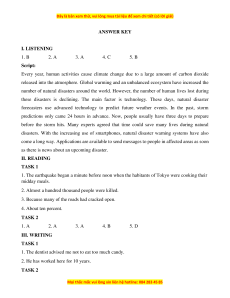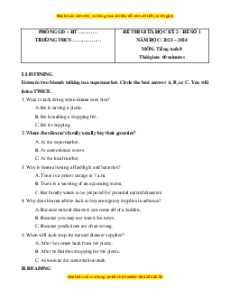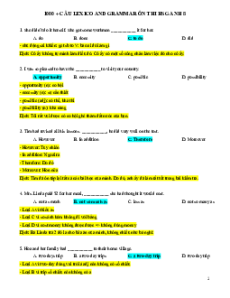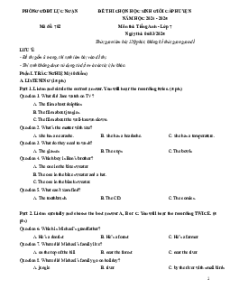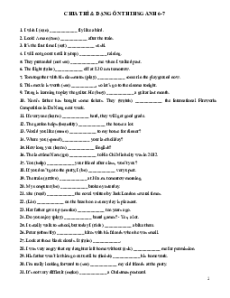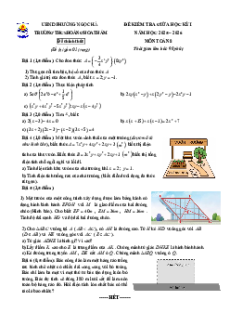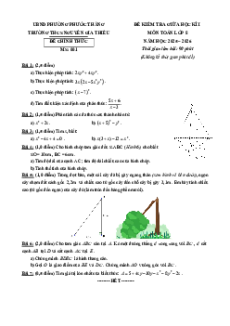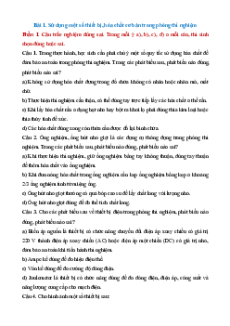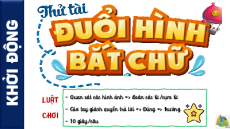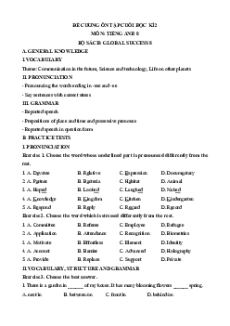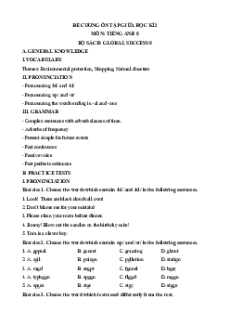PHÒNG GD – ĐT …………
ĐỀ THI GIỮA HỌC KỲ 2 - ĐỀ SỐ 3
TRƯỜNG THCS ………………
NĂM HỌC: 2023 – 2024 MÔN: Tiếng Anh 8
Thời gian: 60 minutes I. LISTENING
Listen to some information about natural disasters and technology. Circle the best answer
A, B, or C. You will listen TWICE.
1. How are natural disasters happening around the world today?
A. They are damaging the ecosystem.
B. They are increasing in number. C. They are less intense.
2. What is the positive effect of using advanced technology?
A. The number of human lives lost is going down.
B. The intensity of natural disasters is decreasing.
C. The power of supercomputers is advancing. 3. Who is a forecaster?
A. A person who predicts future events
B. A person who uses supercomputers
C. A person who reads news stories on TV
4. Currently, how much time do people have to prepare for an upcoming storm? A. 24 hours B. 48 hours C. 72 hours
5. How does advanced technology warn people of upcoming disasters?
A. People can call each other instantly thanks to smartphones.
B. People can receive messages alerting them of upcoming disasters.
C. People can watch the news online.
II. READING
TASK 1. Read the following passage, and answer the questions that follow
Almost a hundred thousand people were killed and half a million homes destroyed as a result of
an earthquake in Tokyo in 1923. The earthquake began a minute before noon when the habitants
of Tokyo were cooking their midday meals. Thousands of stoves were overturned as soon as the
earth began to shake. As a result, small fires broke out everywhere and quickly spread. The fire
engines were prevented from going to help because many of the roads had cracked open. It was
impossible to use fire-fighting equipment as most of the water pipes had burst. Consequently,
over ninety percent of the damage was caused by fire rather than by the collapse of buildings.
1. When did the Tokyo earthquake 1923 happen?
___________________________________________________________
2. How many people were killed in the earthquake?
___________________________________________________________
3. Why was the fire engines prevented from going to help?
___________________________________________________________
4. How many percent of the damage was caused by the collapse of buildings?
___________________________________________________________
TASK 2. Read the following paragraph and complete it with one suitable word in each blank
Anna is excited about the (1) __________activities she is going to do. The Y & Y (2)
___________ a plan to help the community soon. She will (3) _____________ its recycling
programs. In this program, she will collect glass, used paper and empty cans. Then she will send them for (4) _________.
She hopes she can save natural resources and earn some money for her school Y &Y in these
activities. She also thinks (5) ___________ participating in either planting trees and flowers or
helping the street children. It is really interesting, isn’t it? 1. A. interesting B. interest C. interested D. interests 2. A. is having B. have C. to have D. has 3. A. take part in B. took part in C. get in D. got in
4. A. recycle B. recycling C. to recycle D. recycled 5. A. in B. for C. with D. about III. WRITING
TASK 1. Rewrite the second sentence so that it has a similar meaning with the first one
1. The dentist said to me, “You shouldn’t eat too much candy.”
The dentist advised me_________________________________________
2. It has ten 10 years since he worked here.
He has _____________________________________________________
TASK 2. Write a paragraph (80 - 100 words) about the advantages OR disadvantages of a type of shopping. IV. LANGUAGE FOCUS
TASK 1. Choose the letter A, B, C or D preceding the word that is pronounced differently from others 1. A. calm B. alcohol C. ambulance D. awake 2. A. explain B. press C. metal D. intend
TASK 2. Supply the correct form of the verbs in the blanket.
1. He (wash) ___________ his car once a month.
2. When I came, the whole family (have) ___________ dinner around a big dining table.
3. My mother always tells me that I have to (be) ____________ at home by 9 p.m.
4. They (come) ____________ and see me tomorrow.
TASK 3. Choose the best option to complete each sentence. Circle A, B, C, or D.
1. When I was a child, I ..............follow my Mom to the market. A. used to B. use C. get used to D. use to
2. We must be there ..............7:30 and 10:30. A. at B. before C. between D. after
3. They’ll arrive ..............Monday, July 14th.
A. in B. at C. during D. on
4. I like folktale and ..............does my sister. A. neither B. so C. too D. either
5. They wanted to know ..............she left early. A. why B. what C. where D. when
Đề thi giữa kì 2 Tiếng Anh 8 Global success (Đề 3 kèm file nghe)
1.6 K
782 lượt tải
MUA NGAY ĐỂ XEM TOÀN BỘ TÀI LIỆU
CÁCH MUA:
- B1: Gửi phí vào TK:
1133836868- CT TNHH DAU TU VA DV GD VIETJACK - Ngân hàng MB (QR) - B2: Nhắn tin tới Zalo VietJack Official ( nhấn vào đây ) để xác nhận thanh toán và tải tài liệu - giáo án
Liên hệ ngay Hotline hỗ trợ: 084 283 45 85
Đề thi được cập nhật thêm mới liên tục hàng năm sau mỗi kì thi trên cả nước. Chúng tôi đảm bảo đủ số lượng đề đã cam kết hoặc có thể nhiều hơn, tất cả có BẢN WORD, LỜI GIẢI CHI TIẾT và tải về dễ dàng.
Để tải tài liệu gốc về máy bạn click vào nút Tải Xuống ở trên!
Thuộc bộ (mua theo bộ để tiết kiệm hơn):
- Tailieugiaovien.com.vn giới thiệu bộ 5 đề thi giữa kì 2 kèm file nghe Tiếng anh 8 Global success mới nhất nhằm giúp Giáo viên có thêm tài liệu tham khảo ra đề thi Tiếng anh lớp 8.
- File word có lời giải chi tiết 100%.
- Mua trọn bộ sẽ tiết kiệm hơn tải lẻ 50%.
Đánh giá
4.6 / 5(1564 )5
4
3
2
1
Trọng Bình
Tài liệu hay
Giúp ích cho tôi rất nhiều
Duy Trần
Tài liệu chuẩn
Rất thích tài liệu bên VJ soạn (bám sát chương trình dạy)
